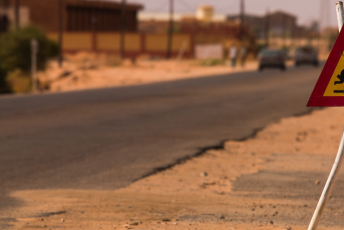Libya has been a hub for migration for decades, the country’s economy relying on foreign workers who fill a need in the local labour market. Since the onset of civil war in 2014, however, Libya has increasingly become a transit country for migrants on their way to Europe, rather than being their final destination. Political instability has created an environment of abuse and exploitation for migrants in Libya, forcing them to leave.
Despite having played the role of anti-immigration police for Italy under Muammar Gaddafi, Libya has hosted a longstanding and tacitly accepted industry in smuggling migrants. This has profited corrupt state officials and tribal groups living in border regions.
But since the revolution in 2011, militia groups have increasingly entered the migrant smuggling business, using the profits to fund their activities. Militias’ involvement has also provided a level of protection for the business, allowing it to proliferate.
The policy of migrants’ arbitrary detention and deportation started during the Gaddafi regime with government forces, and has continued. The appearance of politically driven armed groups with functional control over different parts of the country has worsened the situation.
Many groups established their own migrant detention centres outside of the purview of Libyan authorities. This trend was accompanied by a rise in tension and racism towards migrants, particularly sub-Saharan Africans.
Blassami Touré is an Ivorian migrant of the Association for Africa’s Leadership and Development, a migrants’ association based in Tunis. He told ENACT he finds the debate about Libya ‘surreal, because we still talk about Libya as if it was a normal functional state like we are used to elsewhere, especially in Europe, with laws and institutions, while in fact law enforcement in Libya is ensured by private militias’.
Migrants travelling to Libya and entering from its southern, south-western or south-eastern borders must cross the desert. They cannot do this without the help of Libyan smugglers, many of whom belong to minority groups that have been historically marginalised and rely on smuggling as a source of income. Militias and armed groups also take advantage of the power vacuum at the borders.
Touré said the route to Libya across the southern border with Niger and Chad was a deadly passage whose horrors received little attention from media and NGO reports. He said ‘the bodies of dead migrants are rapidly covered by the sand and forgotten’ in the desert.
But those who survive this passage cannot consider themselves safe yet. A migrant from Guinea in his twenties told the International Organization for Migration that in Libya migrants ‘suffer a lot, [they] … see death, in the desert, in prison, in the streets’.
From the moment they enter Libya migrants face kidnap, exploitation and torture by smugglers, traffickers, armed groups and detention centre staff. When they eventually reach the coast, they board often unseaworthy boats and risk capsizing.
According to Touré, ‘most of the people who take this route know what to expect, but they hope that they will be the exception to the rule’. They risk being piled in informal detention centres, where they are forced to call their relatives and must beg for money to pay for their stay and for the trip to Europe. Those who are not able to pay the ransom are forced to work in the fields, on construction sites, and sometimes as prostitutes to pay their debt.
A Somali migrant in Tripoli, Hamud Abdul Elimi, reportedly said his family paid smugglers to take him to Europe. But they held him in Libya and tortured him. They sold him to another group of smugglers who demanded more money. ‘When I couldn’t pay, they nearly beat me to death,’ he said.
Legally migrants are also vulnerable in Libya. Illegal migration is a criminal offence and Libyan law doesn’t distinguish between migrants, refugees and victims of trafficking. The country lacks a national legal framework to register asylum seekers, and which recognises and protects migrants, their basic rights and dignity. They are all considered illegal migrants and face detention, fines and deportation.
Besides, the definition of human trafficking adopted under Libyan criminal law, articles 418, 419 and 420, is restricted to the trafficking of women for sexual exploitation. It excludes male sexual exploitation and victims of forced labour; and, more generally, victims of transnational organised crime.
Migrants’ legal vulnerability is an essential factor for this market. They must comply with the groups’ demands or risk being denounced to the authorities and deported, or worse – being abused or sold to trafficking groups and other armed groups.
The legal system is only one part of the challenge though. An international law enforcement official told ENACT that he shared Touré’s concerns about the power of militias in Libya and their impact on the safety of migrants.
He said the issue in Libya ‘is not only the lack of protection for migrants or the inadequacy of laws, it is also the deficient state security system and the fact that militias control territories everywhere outside of Tripoli’.
Human rights defenders have also criticised Libya’s border securitisation approach because it is ineffective in preventing migrants from reaching Europe. It simply makes the journey riskier and pushes migrants further underground where they are even more vulnerable.
To reduce illegal migration generally, the international community should concentrate on the reasons driving the phenomenon in migrants’ countries of origin and also address the issue of the informal economic sector in Europe.
Libya should also change its migration laws and policy. It should make them more consistent with protecting basic human rights and dignity for migrants by adopting special legislation dealing with the issue, specifically because the country is a major hub for illegal migration.
Rim Dhaouadi, ENACT Regional observatory, Researcher – North Africa, ISS







